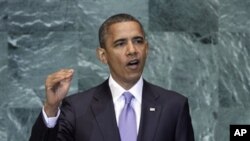Speaking to the United Nations General Assembly in New York, President Barack Obama once again urged the Iranian government to enter into negotiations about its nuclear program:
"The United States and the international community seek a resolution to our differences with Iran, and the door remains open to diplomacy should Iran choose to walk through it. But the Iranian government must demonstrate a clear and credible commitment, and confirm to the world the peaceful intent of its nuclear program."
The President's address at the UN followed a recent report by the Director General of the International Atomic Energy Agency, the IAEA, that Iran has continued to enrich uranium in defiance of UN Security Council and IAEA resolutions, has refused to answer outstanding questions regarding the possible military dimensions to Iran's nuclear program, and barred IAEA's most experienced inspectors from Iran. Among other issues, the report says, the Agency "remains concerned about the possible existence in Iran of past or current undisclosed nuclear related activities involving military related organizations, including activities related to the development of a nuclear payload for a missile."
In his speech to the General Assembly, President Obama noted that when he reached out to Iranian leaders last year to try to persuade them to engage diplomatically on the issues involving Iran's nuclear program, he underscored the fact that as a member of the international community, Iran has both rights and responsibilities:
"I also said – in this hall – that Iran must be held accountable if it failed to meet those responsibilities. That is what we have done. Iran is the only party to the NPT [the Nuclear Nonproliferation Treaty] that cannot demonstrate the peaceful intentions of its nuclear program, and those actions have consequences."
In June, the UN Security Council adopted Resolution 1929, imposing a fourth round of economic sanctions on Iran, demonstrating, the President said, "that international law is not an empty promise." Those sanctions have since been followed by the European Union, Australia, Canada, Japan, Norway and South Korea.
President Obama made clear that the international community seeks to resolve its differences with Iran diplomatically. These efforts are important to the global nonproliferation regime and to the long-term goal of a world without nuclear weapons.
President Obama Speaks On Iran At UN

The international community seeks to resolve its differences with Iran diplomatically.




















